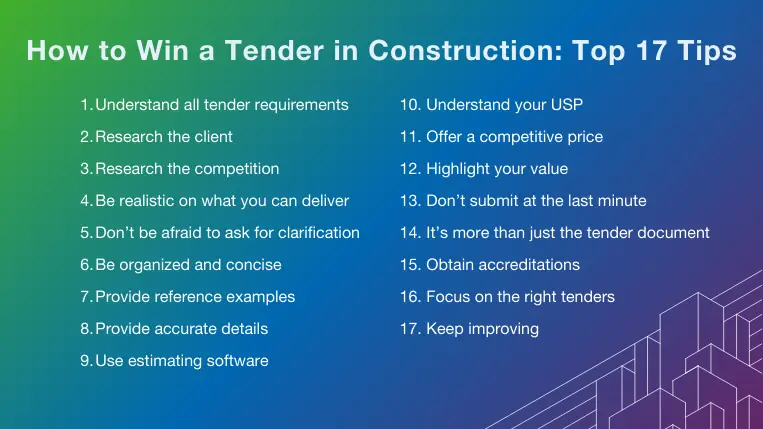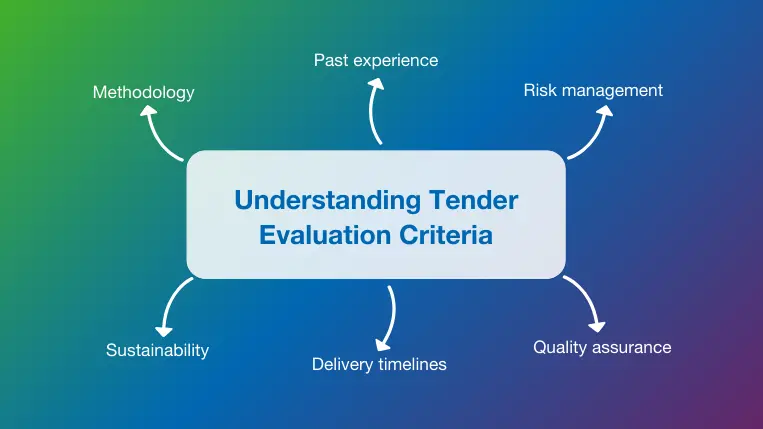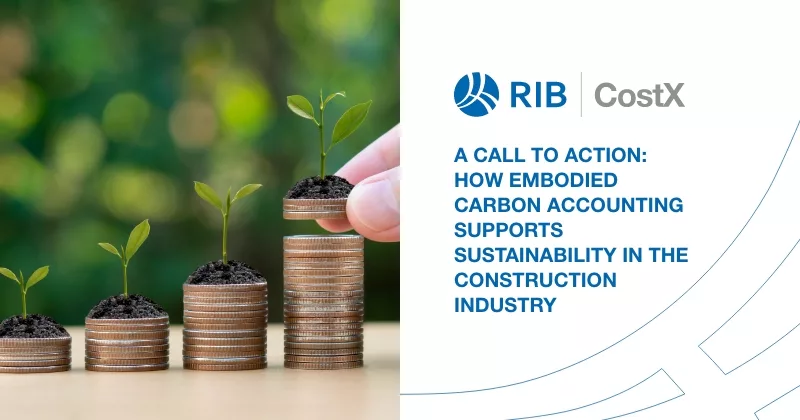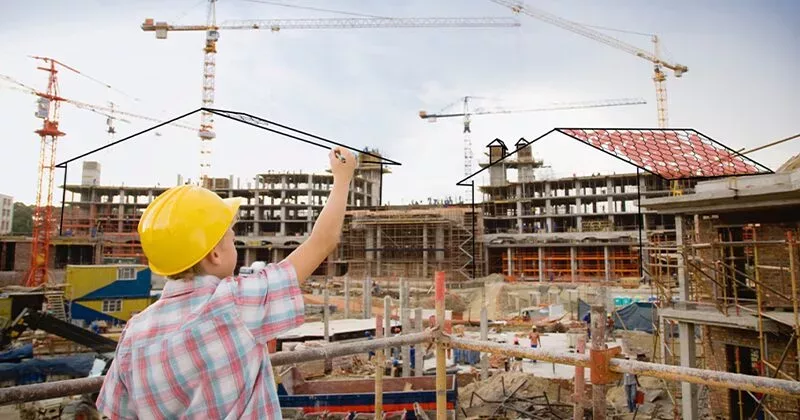11 mins read
How To Win Tenders In Construction

One of the keys to a successful construction business is winning tenders. This allows contractors to gain more clients and build up a pipeline of work, resulting in more consistent revenue and referrals. Winning a tender bid is not always easy, and it requires a highly efficient process to achieve optimal results.
As the construction industry is so competitive, having an accurate high-quality bid is crucial to winning a tender. Eliminating errors and applying thorough cost estimation in construction projects is a must here. But it also takes a bit more than that to help you win a tender.
This RIB blog post outlines the best tendering tips to help you win more projects!
What are Construction Tenders?
A construction tender, often called a bid or proposal, is a formal invitation from a client or project owner to contractors or construction firms to submit competitive offers for the completion of a construction project.
It provides prospective bidders with comprehensive information to evaluate and formulate their proposals by outlining the project scope, specifications, requirements, and assessment criteria. Important information like project schedules, financial restrictions, technical specifications, and quality requirements are usually included in construction tenders.
In-depth bids outlining the bidders’ qualifications, approach, and cost for carrying out the project must be submitted. Strict rules and timelines usually control the tendering process, and the client assesses bids based on cost, technical proficiency, previous performance, and specification compliance, among other factors.
How to Win a Tender in Construction: Top 17 Tips

Winning tenders necessitates a blend of strategic planning, unwavering commitment to excellence, and careful preparation. You may set yourself up for success in the fast-paced world of construction tendering by examining the bid requirements, investigating the client and competition, demonstrating your value, and striving for continuous improvement. Here are some tips on how to win construction tenders and boost your success:
1) Understand all tender requirements
For tender success, the client must be convinced that you can deliver on their requirements.
For a solid tender application, you need to thoroughly understand all the details outlined in the tender documents. This covers requirements, schedules, financial limitations, and assessment standards. Spend some time breaking down each criterion to make sure your proposal covers it all.
2) Research the client
A critical step in getting ready to win a construction tender is researching the client. It involves gathering comprehensive information about the client’s background, preferences, objectives, and project requirements. Thoroughly review the tender documents to find any special requirements or preferences the client may have.
Then, study the client’s past projects, organizational structure, and industry reputation to gain insights into their values and priorities. Examine any particular difficulties or problems they may be having, as well as their long-term objectives and strategic plans. If appropriate, engage with key stakeholders to gain a personal understanding of their preferences and expectations.
3) Research the competition
Learning as much as possible about your competitors is another one of our top tender tips, since this insight will allow you to prepare a bid that stands out from the crowd. This might include an analysis of their marketing strategies, financial stability, and win rates on previous tenders. For example, if competitors who are consistently landing good contracts offer advanced capabilities like building information modeling (BIM) or sustainable building practices, this can point to opportunities for improvement that can help you in the future. Rather than simply mirroring competitors, you can use the competitive analysis data to find a niche solution others do not offer.
4) Be realistic about what you can deliver
Presenting a precise and well-documented tender is important, but if a contractor’s bid is accepted, they must also be able to fulfil the requirements of the tender. Before submitting bids, contractors must be certain that they can meet the requirements of their proposals.
Have a realistic understanding of what you can accomplish within the limitations. Unrealistic delivery demands in tender submissions might have a detrimental long-term effect on your company. Underdelivering on promises might harm your reputation and prevent you from taking advantage of future possibilities. It may result in disgruntled clients and subcontractors. Before placing a bid, ensure that your company can meet the tender’s conditions. Make attainable goals and concentrate on thoroughly completing them.
5) Don’t be afraid to ask for clarification
If any aspect of the tender documents is unclear, don’t hesitate to seek clarification from the client. Asking thoughtful questions demonstrates your attention to detail and commitment to understanding the project requirements thoroughly.
As the deadline for clarification may be much earlier than the bid submission deadline, be sure to bring up any questions promptly. You may want to inquire about specifics regarding the tender requests, specifications, or your ability to bid. In case someone else has raised a noteworthy question, it can be beneficial to read the responses to other bidders’ questions, too.
6) Be organized and concise
A well-organized submission gives the client confidence since it shows professionalism and attention to detail. It’s simpler for evaluators to navigate and comprehend your offering when your proposal is organized in a straightforward and logical way.
Since clients frequently have limited time to analyze multiple entries, conciseness is equally important. You can clearly convey your value proposition and set yourself apart from rivals by condensing complicated material into brief but powerful statements and visuals. In the end, a well-structured and succinct tender application will increase your chances of being accepted and will demonstrate your dedication to completing the project to the highest standard possible.
7) Provide reference examples
A good tender will refer to previous examples completed by the contractor. Being able to reference similar projects will help the client to gain a better understanding of your work. This will build a stronger level of confidence in your company and have a positive effect on any new tenders.
Providing samples will also help the contractor to create a more realistic understanding of what the project will involve, based on past experiences. Showing examples demonstrates your ability to undertake similar projects – something that all potential new clients are interested in.
8) Provide accurate details
Accuracy gives you credibility and shows that you are dedicated to openness and honesty. To ensure accuracy, every detail – from cost projections to project timelines – must be thoroughly researched and verified. Giving misleading information not only damages your reputation but also increases the possibility of miscommunication and conflict when the project is being carried out. In addition to increasing your chances of winning the tender, putting accuracy first in your tender application can help you build a strong and amicable connection with your client.
9) Use estimating software
As already mentioned, the best way to win a tender is by producing an accurate and efficient estimate. This is best done by using specialized construction estimating software. This helps contractors to come up with error-free bids faster, more accurately, and with greater confidence.
RIB Candy helps contractors provide precise, accurate, dependable, and timely bids and estimates. Contractors can submit and win more bids by using Candy to develop competitive and credible estimates and quotes confidently and quickly. Candy provides an outstanding project management system that caters to the specific needs of construction and engineering contractors, encompassing on-screen quantity takeoff, estimating, project planning, and final certificate.
There are many benefits to adopting estimation software like this – the main ones being improved accuracy, efficiency, and management. Not only does this make it more likely to win a tender, but it also enhances the construction process that follows. A fit-for-purpose construction tendering software ticks all the boxes when bidding, allowing more time to be spent on strategic aspects of the proposal.
10) Understand your USP
Every business needs a unique selling proposition (USP) to stand out from the competition.
Contractors need to understand what their USP is in order to grab the attention of new clients. This could be the use of certain products, innovation, quality, trustworthiness, or other attributes. Including this in a tender helps to build your brand, as well as enhance your bid.
Identify and emphasize your unique strengths and advantages relative to your competitors. Whether it’s your sustainable approach, specialized expertise, or exceptional customer service, highlighting your USP can differentiate your proposal and resonate with the client.
11) Offer a competitive price
While quality and expertise are paramount, pricing plays a significant role in the client’s decision-making process. Construction companies need to thoroughly evaluate project needs, do in-depth cost analyses, and take advantage of economies of scale and efficiency gains in order to create a competitive proposal. Achieving a balance between affordability and profitability is crucial to making the offer both competitive and long-lasting.
Construction firms can demonstrate value for money while staying profitable by understanding market dynamics, comparing their prices to industry norms, and strategically positioning their pricing.
12) Highlight your value
Clients realize that value is defined by more than just price. Winning proposals support the competitive price point by pointing out aspects of the business that add value and by highlighting past accomplishments, superior quality standards, years of experience, and other factors that add value beyond price.
A persuasive tender will also explain how the bidder’s offerings align with the client’s long-term mission and values. For example, creative suggestions for cost savings or waste reduction that do not compromise quality can demonstrate a willingness to “go the extra mile” for the client.
13) Don’t submit at the last minute
Rushing through the construction bidding process increases the risk of errors and oversights. Avoid waiting until the last minute to submit a tender proposal. Give yourself ample time to review and refine your bid before the deadline, ensuring that it’s polished and meets all the requirements.
14) It’s more than just the tender document
Submitting a tender is a process that involves more than just the actual bid documents. Clients will form an opinion of you based on how you communicate with them from the start. Understand that the actual tender is important, but every interaction with the client has an impact on your proposal.
Make sure every client interaction is friendly, professional, and contributes to building a relationship that will help you to win a tender. So, arrive at any meetings or site visits on time, respond to emails quickly, and be open with communication.
Showcasing your commitment to excellence can significantly influence their decision-making process. Remember communication in construction is fundamental and it can differentiate you from other bidders.
15) Obtain accreditations
Accreditations can have a significant impact in differentiating your business and bids from competitors. The right accreditations signify reliability, professionalism, and adherence to best practices.
Depending on the region and type of project, accreditations like Certified Construction Manager (CCM), ISO 45001 Health and Safety Management, or other more specialized construction certifications for skills like concrete installation, heavy equipment, and drone operation can be worth the extra time and effort.
16) Focus on the right tenders
It stands to reason that responding to more tenders would equate to more successful bids, but this is not always the case. Preparing a winning tender that is customized for the client and project takes a significant amount of time and research. Bidding on too many opportunities can lead to rushed proposals that lack a personal touch, or include errors and inaccuracies that damage credibility.
While all contractors want a larger pool of tenders to choose from, they should take the time to filter and select those that best align with their resources, capabilities, and goals. This will ensure the tenders they win enhance their experience and industry reputation while also securing an acceptable profit.
17) Keep improving
Remaining competitive requires keeping up with changing customer expectations, industry norms, and technology developments. In order to improve future tender applications, remember to ask for feedback, learn from the past, and adjust strategy through continuous improvement. Whether it’s modernizing estimating methods, adopting cutting-edge technologies, or honing proposal writing abilities, the dedication to progress lays the groundwork for long-term success.
Construction companies can enhance their performance, provide better results, and establish themselves as industry leaders in the field of tendering by adopting a culture of continuous improvement.
Understanding Tender Evaluation Criteria

Price is often the primary factor, but the tender review process also includes pre-defined criteria that each client establishes before they send formal invitations to the construction firms and contractors. Understanding the criteria is the best way to win more tenders, since each project owner will place more (or less) emphasis on each category. Along with the basic financial aspects of the bid, the evaluation criteria are also likely to include:
Methodology
Clients want to understand what construction methods will be used, what specialists or consulting services might be needed, and how this unique combination of resources will satisfy the technical requirements. Public contracts place high value on similar experiences, along with a well-defined plan and demonstrated timeline conformance. Private contracts also emphasize these factors, but they may be more willing to try out new methodologies that can save money or help to meet other objectives.
Past experience
Previous experience is always a deciding factor, whether you are looking for a new job or discovering how to win a tender. Government agencies in the US and other countries are required to review the frequency and relevancy of past experiences prior to awarding a contract. Private entities are not bound by the same regulations, but most consider experience an essential criterion to evaluate. Rather than imposing strict guidelines based on years of experience, private companies often leverage reference checks, portfolios, and client testimonials to evaluate experience.
Risk management
Both private and public contracts emphasize a contractor’s ability to manage risks, but public entities tend to be more regimented in this respect, since they are less willing to accept unnecessary risks that may impact the project schedule or erode public trust. Longer bid tendering cycles, standardized application formats, and structured prequalification steps are all intended to minimize project risks and unknowns.
Quality assurance
The focus on construction quality assurance woven through our tender tips is not lost on clients as they evaluate the quality standards and performance of contractors and construction firms. This applies to both public and private contracts, with the latter sometimes placing a higher value on quality, despite the competing cost and timeline pressures. In general, the long vetting process associated with public contracts, along with a lack of variation in methods, can make cost (rather than quality) the deciding factor, especially when quality is assumed to be relatively equal among all bidders.
Delivery timelines
Along with the price, the speed of completion is another factor that varies in importance depending on the project and client. Private contracts often emphasize speed of delivery, especially when the project is on an accelerated timeline, and task interdependencies make it essential to save time wherever possible. Public contracts typically place less emphasis on speed, since the overall project schedules are longer, and preventing quality issues and rework through a methodical pace helps to keep the budget under control.
Sustainability
A growing number of public and private contracts include sustainability among the key criteria during the tendering process, although each business or entity assesses this trait in different ways. Large public projects are likely to have well-established criteria for sustainability and social responsibility, and assess each bid using numerical scales. Private contracts might place a greater emphasis on innovative sustainable solutions that add long-term value to the building.
Key Skills Required for Winning Tenders in Construction

Securing projects in the competitive world of construction tenders requires a wide range of abilities in addition to technical proficiency. Mastering the art of winning bids takes a multidimensional strategy, ranging from carefully editing your proposals to articulating your value proposition in an effective manner. The following are the main competencies needed to succeed in construction tendering:
Communication
When thinking about how to win tenders, communication must be precise and unambiguous. When communicating effectively, you can create understanding and trust – whether you’re working with clients, a team, or presenting a proposal. To make sure your ideas are in line with the needs and expectations of the client, it’s crucial to effectively communicate your ideas, adapt your message to the audience, and actively listen to their input.
Organization
In tendering, many tasks and deadlines must be managed concurrently. Effective resource coordination, documentation management, and project requirements management all depend on having strong organizational abilities. You can ensure proposals are submitted on time, reduce errors, and streamline the bidding process by adopting reliable systems and routines.
Proofreading
A bid submission can succeed or fail based on its attention to detail. Proofread your proposals thoroughly to identify spelling, grammar, and consistency issues that could confuse the client or damage your reputation. To guarantee the quality and professionalism of your documents, take the time to carefully go over each part, ask for assistance from coworkers or professional proofreaders, and make use of tools like spell checkers.
Strategic thinking
More than merely achieving technical standards is needed to win tenders; strategic thinking and foresight are also necessary. A crucial component of strategic tendering is finding chances for differentiation, evaluating rivals, and analyzing market trends. You can create proposals that are both persuasive and competitive by using a SWOT analysis, which helps you identify your strengths, weaknesses, opportunities, and threats.
Attention to detail
When it comes to construction tendering, the devil is often in the details. Every part of your proposal, including budget estimates and project schedules, must be carefully thought out and verified. In addition to guaranteeing the precision and thoroughness of your proposal, paying close attention to detail shows your professionalism and dedication to excellence. Maintaining attention to detail requires completing crucial tasks such as triple-checking computations, cross-referencing data, and confirming compliance with tender rules.
Common Challenges That Can Prevent You from Winning Tenders

Even the most seasoned specialists may find it difficult to win a tender, as it’s a strategic game filled with obstacles. Tendering in the construction business presents a variety of challenges that can impede success, from managing strict timelines to reducing the risks connected with intricate projects. Common challenges include:
Time constraints
When it comes to winning tenders, time is frequently the enemy. There is minimal margin for error when working under pressure, which makes it difficult to create thorough proposals that accurately represent your skills and value proposition. It’s critical to set up productive workflows, set sensible task priorities, and use technology to expedite the tendering process in order to overcome this obstacle. Construction companies may precisely and confidently achieve deadlines by enhancing time management procedures and developing an agile and responsive culture.
High competition
The construction industry is known for its competitiveness, with numerous firms vying for the same projects. It takes more than just technical know-how to stand out from the crowd of rivals; you also need innovation, creativity, and strategic advantage. Focus on presenting your special qualities, highlighting prior accomplishments, and exhibiting a thorough understanding of the client’s needs if you want to stand out from the competition. You can establish yourself as the go-to option by focusing on your value proposition and providing customized solutions that deal with the unique problems the client faces.
Project complexity
Many construction projects are inherently complicated, posing significant challenges in the form of intricate architectural details, logistical difficulties, and regulatory constraints. It takes careful planning, strong risk management techniques, and close stakeholder collaboration to navigate complicated projects successfully. Through the implementation of phased project management, comprehensive risk assessments, and proactive resolution of potential roadblocks, construction businesses can reduce complexity and enhance their tendering prospects, resulting in tender success.
Inaccurate cost estimation
To create competitive bids and prevent cost overruns throughout project execution, accurate cost estimation is crucial. On the other hand, incorrect cost estimates can be disastrous, resulting in monetary losses, strained client relationships, and reputational damage. Invest in cutting-edge estimating software, make use of historical data and industry benchmarks, and incorporate subject matter experts in the estimation process to tackle this obstacle. By rigorously validating cost estimates and conducting thorough sensitivity analyses, construction firms can ensure the accuracy and reliability of their bids.
Risk management and compliance
Because there are so many factors that can affect a construction project’s cost, schedule, and quality, tendering is always risky. A proactive strategy to risk management and adherence to legal standards are necessary to navigate these concerns. Effective risk mitigation requires early detection of possible threats, creating backup plans, and adhering to industry standards and best practices. Construction companies can instill confidence in clients and show they are dedicated to achieving strong results by making risk management and compliance a priority throughout the tendering process.
Winning Tenders with Sustainability
Everyone knows sustainable building practices are good for the environment, but they can also be good for the bottom line of construction businesses and contractors. Recent global surveys show that 95% of the general public considers sustainable construction important. These numbers make a strong impression on clients and owners, as they realize green buildings have a higher value, and can be more durable and cost-effective to operate over the long term.
In a highly competitive industry, smart contractors understand how they can win more tenders by offering sustainable alternatives or specializing in areas where there is demand for green options. In addition, businesses that include sustainability and social responsibility provisions in their bids and proposals can be attractive to companies with similar values looking to propagate these requirements through their supply chain. This applies to many government contracts where sustainability requirements are not negotiable, and tenders are scored based on their environmental and social impact.
Regardless of the specialty, construction businesses can win more tenders by incorporating green practices and offering sustainable alternatives. Most clients recognize when this is not already ingrained in the culture, so making these values part of the organization puts more tenders within reach.
Low carbon materials
The building and construction sector accounts for 37% of global carbon emissions. Finding effective ways to reverse this trend is a great way for construction firms and contractors to distinguish themselves during the tendering process. Sustainable construction materials like hempcrete, bamboo, and reclaimed wood is a must. Companies bidding for new contracts should also be able to provide embodied carbon figures for each material and understand the important balance between material cost and sustainability benefits.
Waste reduction strategies
Reducing waste before and during the construction process is another consideration that can distinguish bidders with a more sustainable approach. Effective strategies include repurposing existing wood, steel, and concrete, committing to accurate takeoff and estimation practices to prevent excess materials, and planning deliveries and equipment utilization wisely to reduce fossil fuel consumption. Prefabrication and modular construction methods have also proven to be less wasteful while reducing the carbon footprint.
Community involvement
The social aspects of Environmental, Social, and Governance (ESG) ideals can also be extremely important during bid tendering. This can be demonstrated by bidders making a commitment to engage with the local community to ensure their concerns are heard, participating in volunteer activities like tree planting that also improve the environment, or purchasing materials and supplies from locally owned businesses.
Water conservation
Energy consumption and carbon emissions are chief concerns when evaluating bids based on sustainability criteria, but water conservation is also very important to many clients, since it’s part of the scoring process for prestigious building certifications like LEED and BREEAM, which award points for implementing water-saving strategies. Building companies can assist with conservation by offering and installing water-efficient fixtures, showers, and plumbing systems, or minimizing water use during construction by recycling the water used for cooling and cleaning processes.
Green certifications
Obtaining third-party green certifications is a great way for bidders to win tenders by differentiating themselves from the start. Globally recognized certifications like ISO 14001:2015 are evidence of a company-wide commitment to sustainability. Participating in projects that successfully obtained green building certifications can also be a huge benefit, and should always be highlighted by contractors when they submit their tenders. These qualifications provide assurances to clients seeking similar results on their own projects.
The Bottom Line
Construction companies can become leaders in winning tenders by utilizing cutting-edge technologies such as RIB Tender and RIB Project. These software programs collectively redefine project management and procurement processes in the construction industry. RIB Project provides a robust platform for overseeing every facet of project lifecycle management, from initial planning and scheduling to budgeting and execution. Its sophisticated features enable project managers to optimize resources, monitor progress, and mitigate risks effectively, ensuring timely and successful project delivery.
In addition, RIB Tender is a modern tender software that provides a complete solution for expediting the bidding procedure. Through the digitization and automation of the production, dissemination, and assessment of tender papers, RIB Tender improves stakeholder collaboration, efficiency, and transparency while promoting competitive and fair bidding.
Construction professionals can now confidently, precisely, and efficiently accomplish their project goals with RIB Project and RIB Tender’s integrated end-to-end solutions.
In the end, winning tenders is about more than just landing contracts — it’s about creating long-lasting bonds, providing outstanding value, and influencing how the built environment is developed going forward. The road to success in construction tenders becomes more than just a journey when one is committed, persistent, and has a forward-thinking mindset. It becomes a fulfilling quest for perfection.
Ready to build better? Get your free demo and try RIB Software solutions today!
Book a Free Demo for RIB Software
Most Recent
11 mins read
10 mins read
10 mins read
27 mins read
Blog Categories

Ebook











